Keyword grouping, also known as keyword clustering, is an important aspect of SEO. It helps you to see which keywords belong together in the same piece of content.
For example, there may be related keywords that you haven’t used in your article and that you should be using. Conversely, there may be related keywords that belong to a slightly different topic and need to be used in a different article.
It’s a powerful tool for ensuring that your content has greater relevance and therefore ranks higher in the search results.

What Is Keyword Grouping?
Keyword grouping is the process of organizing keywords into groups of semantically-related keywords. It’s an important part of organic search marketing because it helps you create content that is authoritative for the topic you are writing about.
The idea behind keyword grouping is that some keywords should appear in the same piece of content whereas other keywords, although they might be related, belong in a separate piece of content.
In the early days of SEO, people used to do keyword grouping manually, using an excel sheet. But there are now automated tools that will do in a few minutes what used to take hours.
Benefits of Keyword Grouping
Through machine learning and latent semantic indexing, search engine algorithms know that certain keywords cluster together. And those keyword clusters correspond to particular topics.
Remember that SEO is not about individual keywords anymore, but about topics. Grouping your keywords into semantically related clusters helps ensure that your piece of content covers a particular topic. And that can give a tremendous boost to your SEO efforts.
Keyword grouping also helps to avoid a common problem in SEO – keyword cannibalization. This is where you have two or more pages competing with each for keywords that have the same search intent.
Here’s an example. Let’s say you are writing a piece of content about ‘how to hire a lawyer’. And then you write another article titled ‘10 tips for hiring an attorney’. The search engines regard ‘attorney’ and ‘lawyer’ as the same thing.
So those two articles are going to compete with each other in the search results. The result is that neither article will rank as well as it would have done if you had written one article that used ‘lawyer’ and ‘attorney’ interchangeably.
Here’s a summary of the benefits of keyword grouping:
- rank for more search terms than you you would if you focus on one keyword
- discover if related keywords should be on the same page or whether should have their own page
- avoid creating multiple pages that target the same search intent
- add topical authority to your pages so that they rank higher
Keyword Grouping Principles
The principles behind keyword grouping are quite simple.
Step One
First, you create a list of related keywords. For this, you can use any keyword tool. In this example, I’ve used the Google Keyword Planner to create a list of keywords related to ‘kitchen appliances’.
Step Two
Then you paste your list of keywords into a keyword grouping tool. In this case, I’ve used a free keyword grouping tool called Contadu.
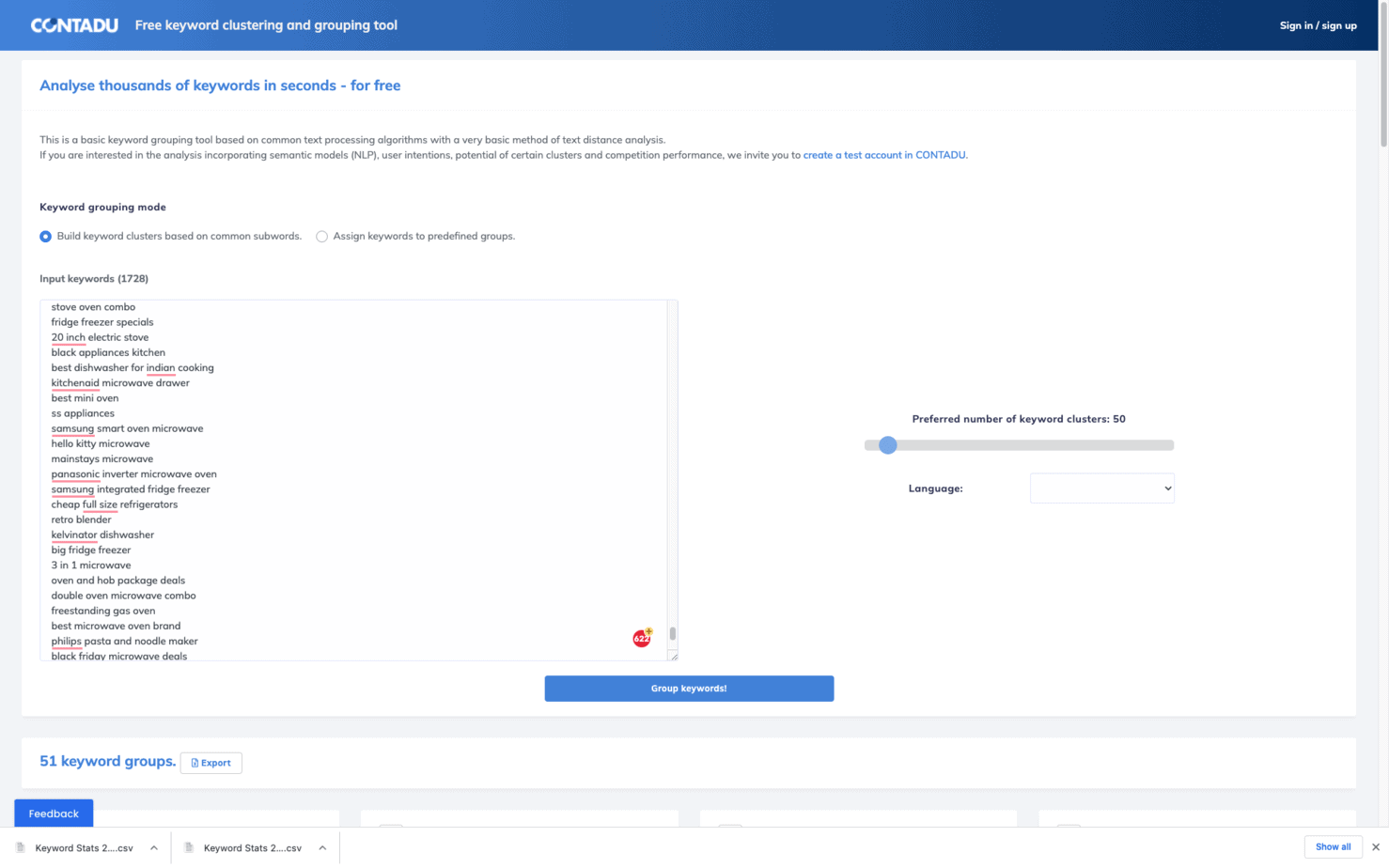
The keyword grouping tool will then analyze your list of keywords and sort them into semantically related groups:
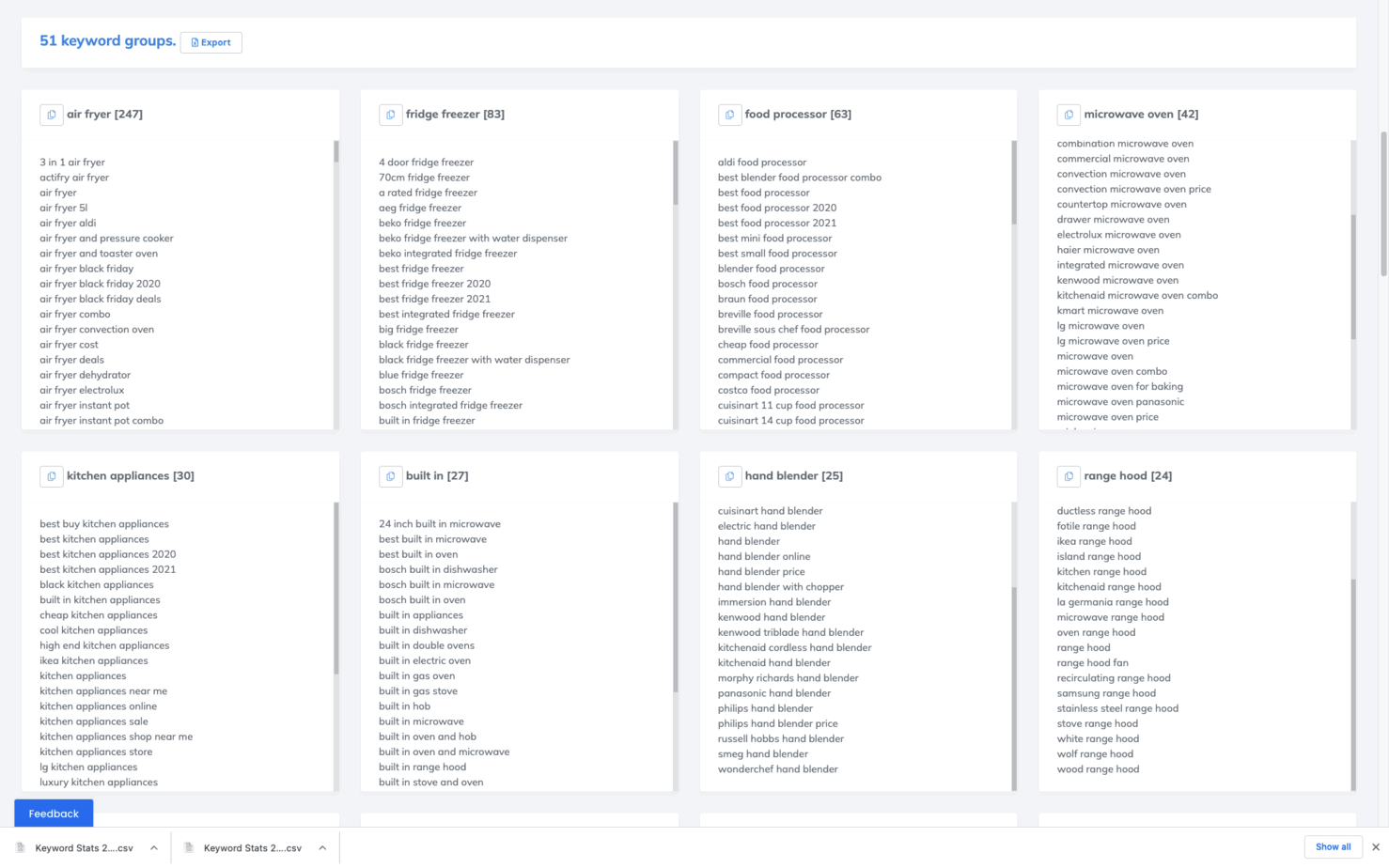
Step Three
These tools are only a guide and you still need to use your own judgment. For example, you might decide that the group ‘food processor’ is too broad for a single piece of content:
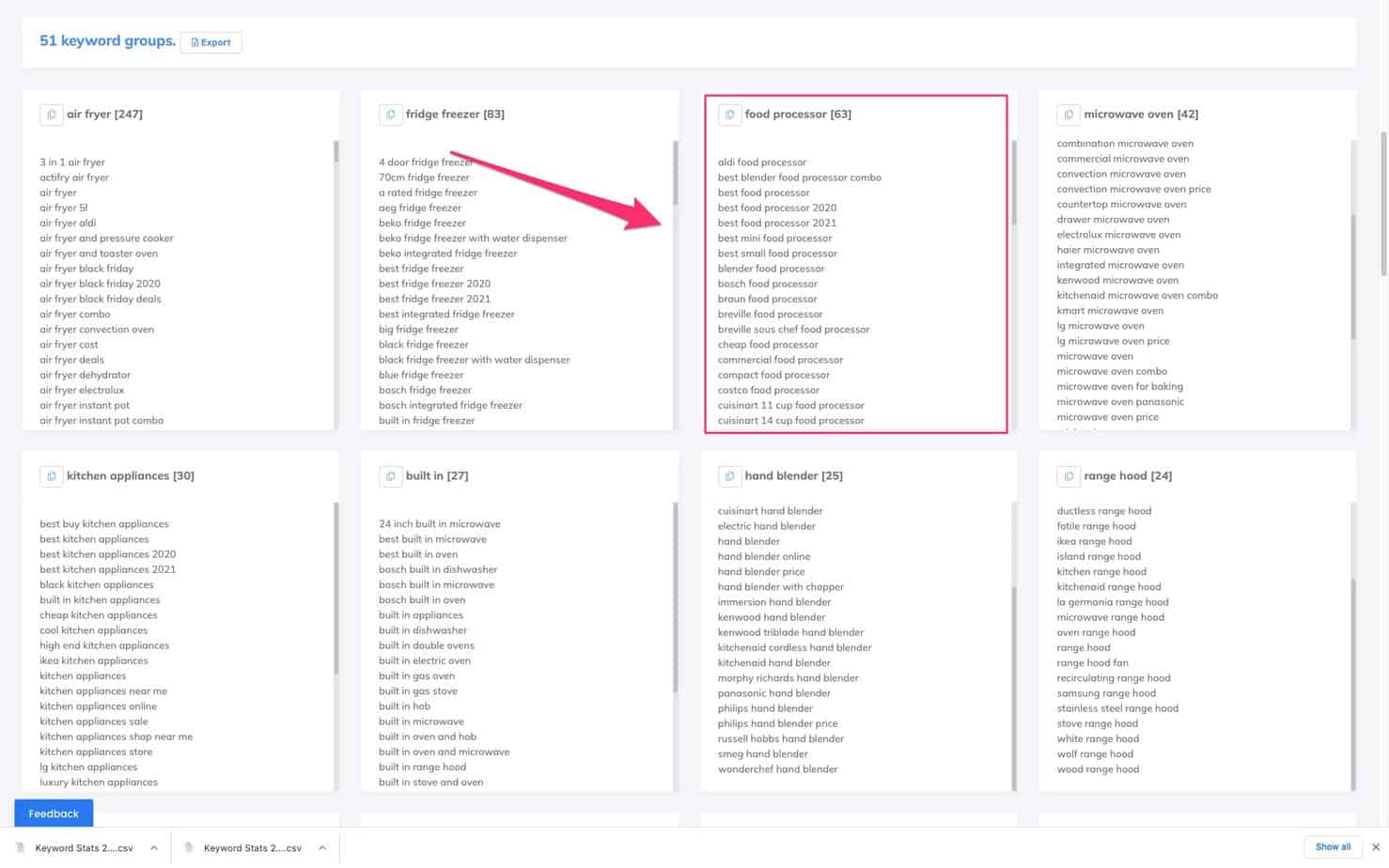
You would then go back to your keyword tool and get a list of keywords related to ‘food processor’.
Then paste that keyword list into your keyword grouping tool. Now you get groups of related keywords within the category ‘food processor’:
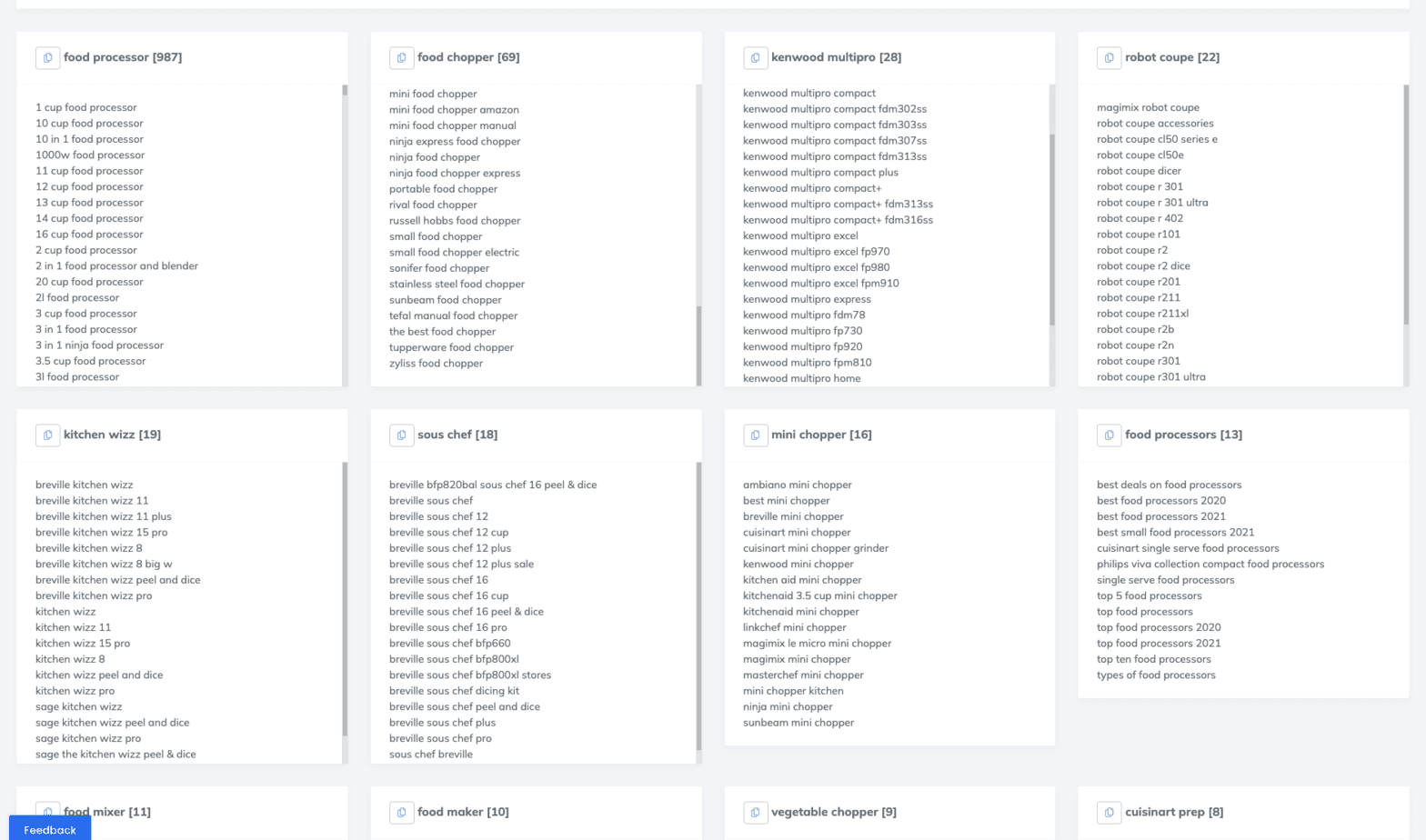
Step Four
The final step is to write your piece of content around that group of keywords. In this example, I might decide to write an article about ‘food choppers’ (a keyword grouping within ‘food processors’):
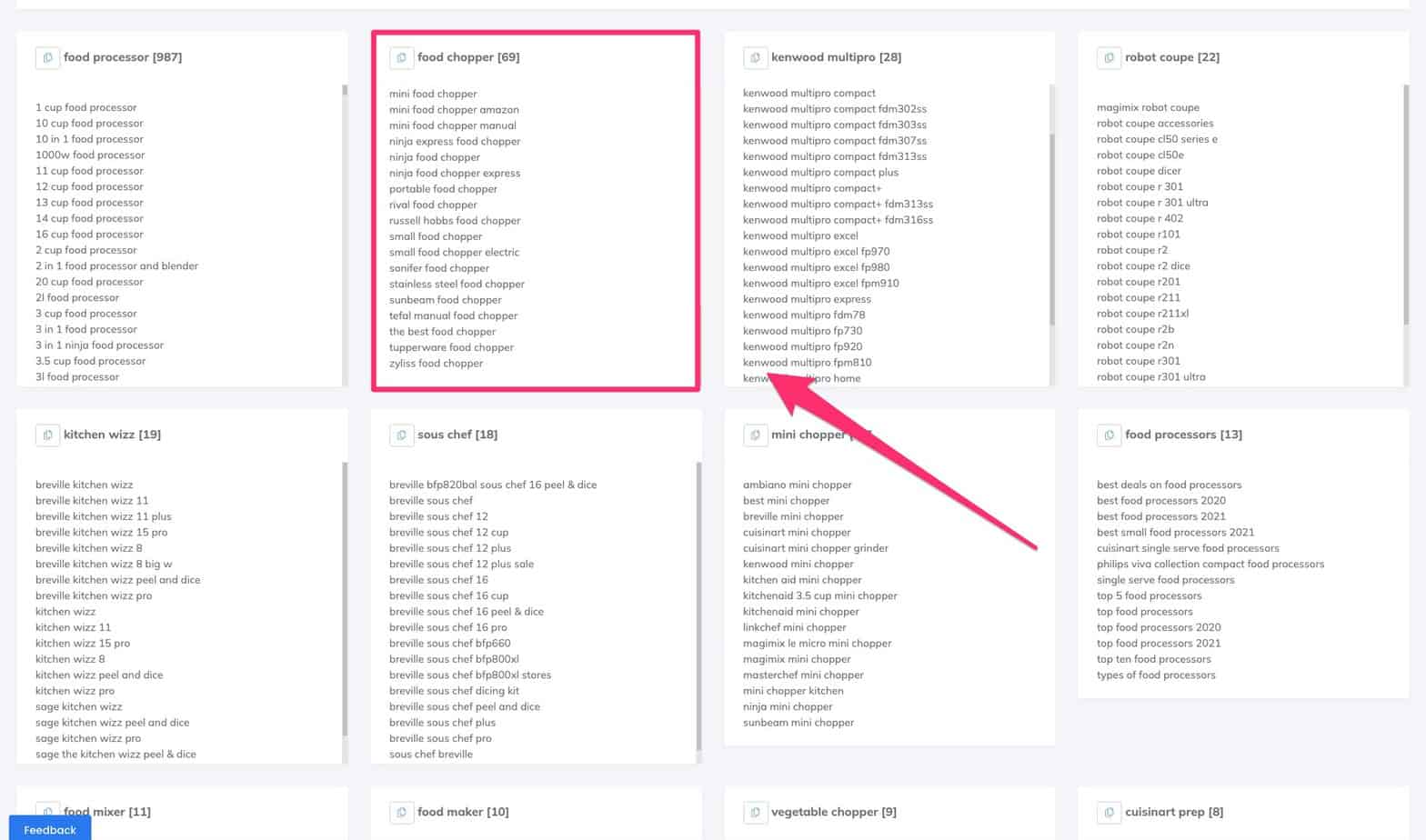
There are 69 words in that keyword grouping: these are keywords that you can try and use in your content piece of ‘food choppers’.
Using those words (or as many of them as you can) will not only increase the topical authority of your article, but it also means that your piece of content is going to show in many more search results.
Keyword Grouping Techniques
In keyword grouping, there are two main techniques that are used: ‘soft clustering’ and ‘hard clustering’.
In soft clustering, the tool takes a keyword from your list and analyzes the top 10 search results for that keyword. It looks to see if any other keywords from your list are found with your target keyword. If so, those keywords are added to the group. In soft clustering, a cluster can contain any keywords that are found together in the search results.
In hard clustering, a cluster can only contain keywords that are all found together.
Soft clustering is used for less competitive keywords whereas hard clustering is used for more competitive keywords.
Keyword Grouping Tools
Here are five of the best keyword grouping tools, some free and some paid.
Contadu
Contadu’s free keyword clustering and grouping tool uses text processing algorithms and text distance analysis to create clusters of keywords that correspond to searcher intent.
Keyword Insights
Keyword Insights groups keywords according to search intent. It uses live search engine result pages (SERP) data to cluster keywords into similar groups based on the search intent. The output tells you which keywords you can target on a single page, and which keywords need to be spread across multiple pages.
SEO Scout
SEO Scout’s free Keyword Grouping and Clustering Tool uses Natural Language Processing (NLP) to analyze the top 30 Google results for your keyword. It helps ensure that your content piece covers all the entities and topics Google expects you to include.
This is a great tool if you are creating topic hubs: clusters of related content grouped around a core ‘pillar’ page. It enables you to quickly see patterns in huge keyword lists so you can see what the topics and subtopics are and which deserve their own page.
SE Ranking
SE Ranking’s Keyword Grouper uncovers all the various combinations of synonyms, closely-related terms, and thematic words that you need to include to show Google that your content has topical relevance. The Keyword Grouper helps you expand the semantics of your topic by finding new keyword variations, synonyms, and closely-related terms.
How Do I Create a Keyword Group?
Start off by choosing a seed keyword. Let’s take ‘garden tools’ as an example.
Then go to a keyword grouping tool such as Contadu’s keyword clustering tool, and type in your seed keyword.
Next, choose one of the groups that your keywords have been sorted into. In this case, I’m going to take the group ‘pruning shears’:
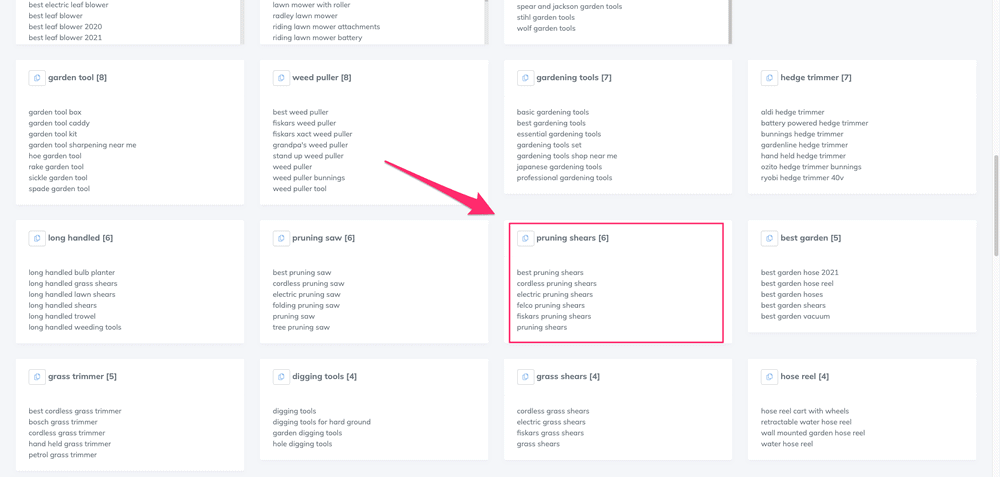
If the keyword group has less than 20 keywords, take the title of the group (in this case, ‘pruning shears’, and go back to your keyword research tool and type in that keyword.
Now take the keyword list you got from that second research and drop that list into your keyword grouping tool.
This time, my keyword group has over 200 keywords.
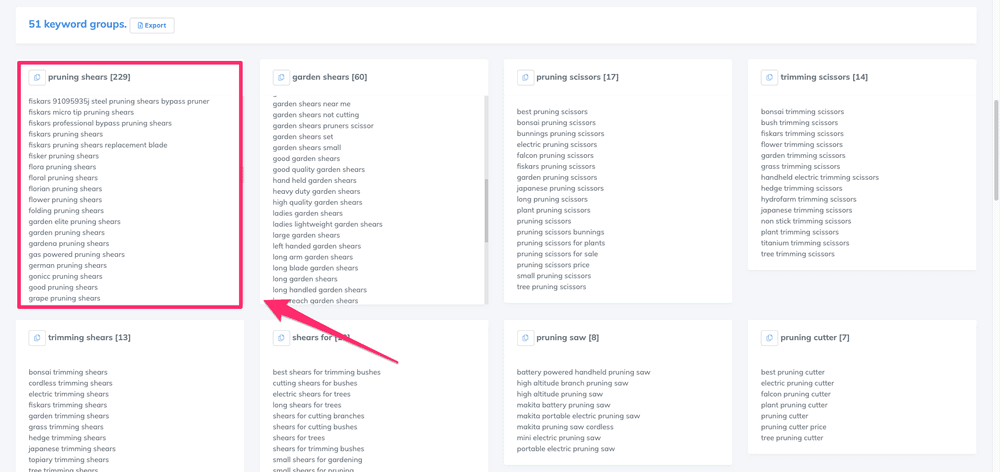
The keyword grouping tool should have sorted your keywords into discrete topics or subtopics. But its only a machine and so you need to check whether those words all belong to the same topic.
Go through that list and decide whether those keywords all belong in the same article or whether some of them need an article of their own.
And that’s basically the process for creating your own keyword groups.
Conclusion
Keyword grouping is a technique you can use at scale to quickly grasp the sub-topics within a topic. A good keyword grouping tool will help you identify which keywords should be used together in the same piece of content and which keywords belong in a separate piece of content.
A keyword grouping tool will help you plan your content creation strategically and also ensure that each piece of content you create has high topical relevance.
Related Resources
- How To Use Keyword Modifiers To Rank on Google
- How to Find Seed Keywords for Better SEO (2 Simple Methods)
- What Is a Focus Keyword – 7 Tips For Better SEO
- How To Find Long Tail Keywords Using Free & Paid Tools
- How To Rank for Multiple Keywords and Triple Your Traffic
- 21 Types of Keywords in SEO & How To Use Them
- What Are Stop Words In SEO – Everything You Need To Know
- High Intent Keywords – What They Are & How To Use Them
- The Keyword Golden Ratio: The Secret To Ranking on Google
- How To Use ‘People Also Ask’ (PAA) For Better SEO
- What Are LSI Keywords & How To Use Them To Rank Higher
- What Is Keyword Research – A Guide For Beginners (2022)